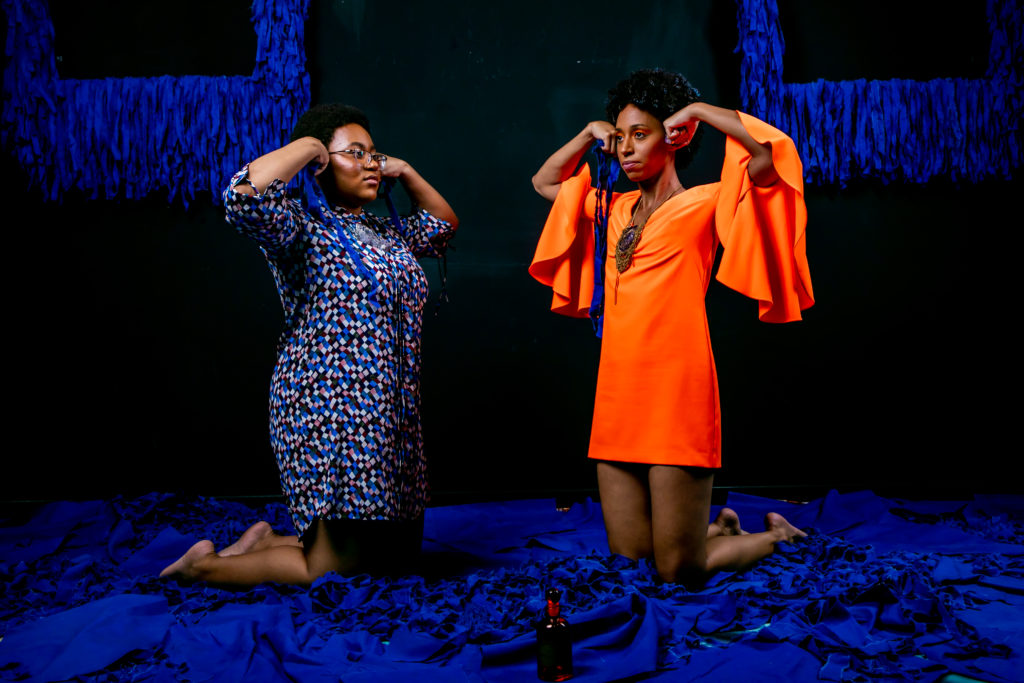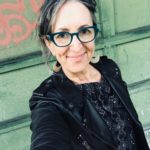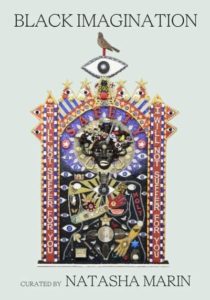Black Joy: An Interview with Artist Natasha Marin
Interviewed by Joy Katz

Natasha Marin with daughter Roman. Photo: Erika Schultz
Natasha Marin is the curator of Black Imagination: Black Voices on Black Futures (McSweeney’s, 2020). Marin is also a conceptual artist whose people-centered projects have circled the globe since 2012 and have been recognized and acknowledged by Art Forum, the New York Times, the Washington Post, the LA Times, NBC, Al Jazeera, Vice, PBS and others. In 2018, the City of Seattle and King County backed Black Imagination—a series of conceptual exhibitions—ampl
Joy Katz: A conversation in moonlight would be better than email, but you are in Seattle and I’m in Pittsburgh. Still, I would like to create a between-seeing. I just don’t know how. Do you?
Natasha Marin: I read your questions aloud to my secret lover just crying. Tears streaming down my face.
I am angry because I don’t know suddenly if you are white … or where your whiteness is anchored.
I need to just cry for a while. You can keep asking questions. And romance is the fabric of strangers tracing the distance between each other.
JK: I didn’t mean to be elusive. I am sorry I made you angry. Now I’m not sure whether to make clear my positionality or let this sit for a few minutes, but I have to step out, so it will sit and I’ll be back soon—
Marin: My anger isn’t for you. It was surprise. I had switched you with another person in my mind. I surprised myself. I bait and switched myself. It was never you.
Several years ago, I was in Pittsburgh curating an event, and my host introduced me to a woman whose many children sort of bedazzled me with all sorts of child-love and very primordially readied me for the evening. This woman is Black and her name is Joy and she has never shifted from my mind even though that was years ago now … in Time. In thought though, she is *right there* … so even though I could have known better, if I had been in a space of knowing at all, what my Black Imagination did was pretend you were her. And then you were you. And everything about your approach intrigued/s me. I’m sorry about my synaptic snafu.
Again, and again, we will begin. Let’s be natural. This is The Natural now—so let’s do what flows. I like how you started.
Whiteness unsettles if unaccounted for. You know when you see a spider and you take note of its location, but when you look again … it’s gone and now all you have is the unsettled feeling that there Is a spider … you just don’t know where it is (now)?
Well it’s like that.
Let’s go back to your beginning.
Shall we? We are already dancing.
JK: Whiteness as a disappearing spider—that describes my experience trying to write about, and unlearn, whiteness in order to not mess up raising my son (adopted as a baby in Vietnam). I thought: I was certainly going to see whiteness and certainly stop doing what whiteness was getting me to do. It should be obvious enough, I thought, to find the white drinks and stop drinking them, the white way of dressing and stop dressing that way, to stop answering questions with white answers. I actually thought these things! And then whenever I got a good look at whiteness, it skittered away.
Of course, the damage whiteness does is clear. Visible. Feelable.
Marin: Spoiler alert: Whiteness is imagined and irrelevant.
Folks capable of critical thinking can link Humanness to Blackness very easily. Whiteness is an artificial boundary separating some people from The People.
JK: Or whiteness is a performance.
Or whiteness rides perceiving, it rides language, it is a rider…
A friend proposes that blackness is as hard to pin down, too, that there’s no solid place to stand, either, there.
Manning Marable: “Whiteness imposes blinders that shut off the full spectrum of social reality, the shared experiences of people from different racialized backgrounds in the making of a common history.”
Marin: Whiteness’ irrelevance is behind the empty propaganda that Whiteness has always been.
I absolutely guarantee I’ve spent more time thinking about this than you have. Although everyone is entitled to an opinion … they are like assholes after all, everyone has them.
Like strategically, if I have the agency to put together three art exhibitions called Black Imagination that is now going to be in book form, why would now be the time to clarify relevance vs irrelevance?
And now I’m wondering if I’m interviewing you. Lol. Stop navel-gazing. It’s hella white!
Why might I, at this point in our exchange (an interview gleaned from correspondence?) would I point out that Whiteness is irrelevant?
Like why do you think I’m saying this?
(Hint: It isn’t about feelings.)
My question is rhetorical. It’s something I want you to think about. But you may continue to ask me questions if you’d like?
JK: I see the book as connecting humanness and blackness. It creates a space, necessarily apart from whiteness, that strengthens the connection—frayed by racism and internalized racism—between Blackness and humanness.
As a white reader, I get to enter the space of Black Imagination, a rare opportunity.
What was it like for you translating three exhibitions into a single book? It seems like adapting a play into book form, or moving between languages translating poems.
Marin: Ambitious. A little terrifying. Exciting. In the end, the book Black Imagination became its own delineated space that exists apart from, although adjacent to, the three exhibitions that came before it. For me, Black Imagination is a way of life. So, I don’t think I’ll be going back to the way I was before I started this work. And the exhibitions also continue. Next year, Black Imagination: Sites of Power will be shown at the Northwest African American Museum here in Seattle (April – August 2020).
I have long been fascinated by translation … what refuses to traverse from one tongue to the other. Over a decade ago, when Kwame Dawes and I were exchanging haiku every day like pen-pals, I was also working with a tutor to translate these chains of haiku into Japanese. Many things I wanted to say were impossible to translate exactly or even approximately within the syllabic framework. And poetry is always about more than just words. It’s about sound, silence, cadence, resonance, metaphor … as such, poetry is the blueprint for so much of my fully immersive work, including Black Imagination.
JK: Black Imagination as a way of life—what does that look like?
Marin: Remember before you were a parent?
It’s like that.
There is no going back, once you’ve begun the revolution that is being black and joyful, while loving your Black body/mind and attending to its needs.
JK: To your earlier question, I think you asked about the relevance of whiteness because Black Imagination is a book “about saying and doing what we need/want to imagine and heal. Black Imagination is a reclamation of our bodies, space, intelligence, care, and joy.”
I’m outside the We of Black Imagination. Inserting my thoughts about whiteness into this exchange may have interrupted that healing. I’m sorry. You were trolled and suffered personally during your Reparations project (a project by the way that I love and wish I could have participated in). Black Imagination is part of your self-reparations for Reparations. I wonder if putting forward thoughts about whiteness amounted to more harm.
I am guessing, and I don’t like to guess, but i want to get things straight. I’m a white stranger out here on email.
In my community, the language “whiteness is irrelevant” and “whiteness doesn’t exist” lead to suicidality and depression. There is a suicide epidemic among our kids (children in international adoptive families, often brown kids with white parents), so I can’t let the sentence “whiteness is irrelevant” sit without questioning it—it’s like an icy wind on my bare stomach.
I know this is not where you’re coming from, but you can probably imagine the words “whiteness doesn’t exist,” in a white parent’s mouth, as a form of denial. White parents deny that their brown kids are suffering from racism, often in their own families. I won’t bring up my experience again, it’s not relevant to your book. I just wanted to explain how “whiteness doesn’t exist” and “I don’t see his skin color” are, in another context, the language of liberal colorblind racism.
Marin: I like that we can no longer tell who the interviewer or interviewee is, lol.
All the lines are blurry.
You must, as a fellow word-nerd, know that there is an ocean of nuance between “Whiteness is irrelevant” which is what I stated and “Whiteness doesn’t exist” which you … interpreted?
Tell me more about the cold suicidal wind of irrelevance. I want to hear it. I want to because being black and AFAB is the territory of systemic erasure and dismissal. Perhaps this is common ground?
JK: You mean, describe how the cold suicidal wind works, where it comes from?
Marin: I wanted to know more about how you knit whiteness, irrelevance, suicide, and wind.
But, we can also talk about Blackness.
What is your understanding of Blackness?
JK: This conversation is pretty incredible. It started with you literally thinking I was Black Joy. I am not Black Joy, but also I’m not not-black-joy. I’m Joy Katz.
Your question reminds me of the line in Song of Myself, “a child asks, what is the grass?”
The line would be different Whitman asked, “what is your understanding of the grass?”
“What is your understanding of blackness” — is a very large question. As with “what is your understanding of Asianness,” I can’t find a place to enter it.
If I’m honest, in this conversation the question feels like a trap. It suggests there’s a right or complete answer.
To respond about systemic erasure and dismissal: I think this might be common ground.
In our community, kids’ feelings and experiences of racism are erased by white parents and others, including teachers. Our kids hear “skin color is irrelevant” and “whiteness is irrelevant” and also “love is enough” e.g. Love is what makes a family, and even though you are adopted, and have a different skin color, there is no empty space inside you! You are complete! — constantly. Guilt, anger, and rage pile up.
The violent myth of the model minority makes things worse for our kids, and much worse for black kids by its implication that the Black child across the room is not “naturally gifted” or smart or organized or capable or whatever.
I don’t every moment think of my child as “Asian” and I don’t think of myself in every moment as “white.” Most minutes, I’m his mom. At the same time, if in any moment i don’t see who he is, I risk erasing him.
I don’t want to Other him, and I don’t want to erase him. I’m always dancing in the middle. Mainly I want him and his friends to stay alive.
At this point, Marin and I switched to Facetime. When we saw each other, the tension of our written exchange didn’t exist. The anxiety I felt about being a white woman interviewing a Black artist about her project didn’t exist. The call was like starting over (but with a little trust built up gradually in our written exchange). As such, it underlined the limits of communicating only onscreen, especially about hard subjects. Our live conversation is unrecorded. Below, we try to sum it up.
_____
JK: can you tell me some things you remember from our Facetime? Here are some of mine. Not a ranking, just things:
- Natasha, fuzzy white sweater, pajamas, lying on her sofa
- crying
- Joy’s inability to cry these days
- laughing
- N hand-rolling a cigarette with lavender
- the movie Billy Elliot
- Parenting. How to calibrate our emotional affect; inability to gauge and predict teenkid reactions; the calm that worked in the past that they now can’t stand
- more laughing, laughing often
- a $50 ticket to Brazil (or was it Ecuador?)
- bottles of black joy
- N’s day job doing anti-bias/anti-racist training for orgs
Marin: I’m smiling that my crying wasn’t number 1.
Racism and lived experiences of inexplicable betrayals and acts of dehumanization that come with it can make otherwise strong people cry (racism is so rude, fundamentally); the cancelled ticket was $50 to Quito, Ecuador; we spent lots of time talking about the range of adolescent emotions; our children in general was huge common ground; I started our call by saying, what y’all will never seem to understand is how derailing these experiences of racism are to us because they interrupt our lives— they don’t define them. Like I’m a whole person, living a whole life, up until the moment some fucking idiot “niggerizes” me. Black people are never expecting racism the way White Society seems to expect us to … does that make sense?
Also, decentering whiteness and centering the vast black Imagination is currently changing my life. We are so constantly dismissed erased and invalidated— this work is restorative. Yesterday I spent hours again just listening to black folks respond to my esoteric-ass questions like “how do you heal yourself?” And I learned so much that can’t even distill itself into words yet.
This morning, I learned about Nigerian “osu” and yesterday morning I learned about “zambo” and “placage” … all because I think trying to decode my family tree might be the highest math I’ve ever done.
 Joy Katz’s poetry and essays cover whiteness, tennis, sentimentality, and other things. She has three poetry collections, most recently All You Do is Perceive, and two chapbooks. Her new manuscript, The Color Cure, documents every minute of whiteness in her life. A past NEA and Stegner fellow, Katz collaborates in the interdisciplinary collective IfYouReallyLoveMe, based in Pittsburgh, Pennsylvania, where she lives and teaches in Carlow University’s long-running Madwomen in the Attic writing workshops for women. She is an editor-at-large for Copper Nickel.
Joy Katz’s poetry and essays cover whiteness, tennis, sentimentality, and other things. She has three poetry collections, most recently All You Do is Perceive, and two chapbooks. Her new manuscript, The Color Cure, documents every minute of whiteness in her life. A past NEA and Stegner fellow, Katz collaborates in the interdisciplinary collective IfYouReallyLoveMe, based in Pittsburgh, Pennsylvania, where she lives and teaches in Carlow University’s long-running Madwomen in the Attic writing workshops for women. She is an editor-at-large for Copper Nickel.

